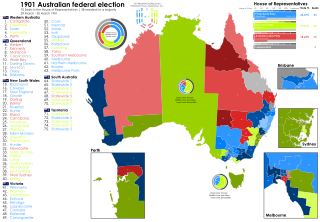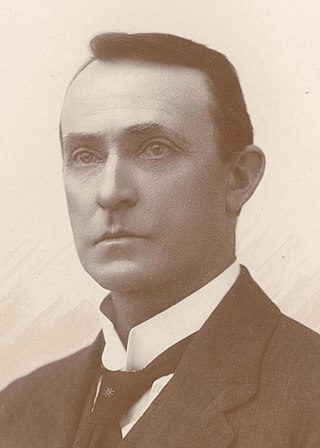
The 1901 Australian federal election for the inaugural Parliament of Australia was held in Australia on Friday 29 March and Saturday 30 March 1901. The elections followed Federation and the establishment of the Commonwealth of Australia on 1 January 1901. All 75 seats in the Australian House of Representatives, six of which were uncontested, as well as all 36 seats in the Australian Senate, were up for election.
This is a list of the members of the Australian Senate in the First Australian Parliament, which was elected on 29 March 1901. There were 36 senators in this initial parliament. Terms were deemed to start on 1 January 1901. In accordance with section 13 of the Constitution, the Senate resolved that in each State the three senators who received the most votes would sit for a six-year term, finishing on 31 December 1906 while the other half would sit for a three-year term, finishing on 31 December 1903. The process for filing of casual vacancies was complex, with an initial appointment followed by an election. The status of political parties varied, being national, State based, and informal.

The 1903 Australian federal election was held in Australia on 16 December 1903. All 75 seats in the House of Representatives, and 19 of the 36 seats in the Senate were up for election. The incumbent Protectionist Party minority government led by Prime Minister Alfred Deakin retained the most House of Representatives seats of the three parties and retained government with the parliamentary support of the Labour Party led by Chris Watson. The Free Trade Party led by George Reid remained in opposition.

The 1906 Australian federal election was held in Australia on 12 December 1906. All 75 seats in the House of Representatives, and 18 of the 36 seats in the Senate were up for election. The incumbent Protectionist Party minority government led by Prime Minister Alfred Deakin retained government, despite winning the fewest House of Representatives votes and seats of the three parties. Parliamentary support was provided by the Labour Party led by Chris Watson, while the Anti-Socialist Party, led by George Reid, remained in opposition.

David Storrer was an Australian politician.

David John O'Keefe was an Australian politician and journalist. He was a member of the Australian Labor Party (ALP) and served in both houses of federal parliament, as a Senator for Tasmania and holding the House of Representatives (1922–1925). He subsequently entered state parliament, serving as Speaker of the Tasmanian House of Assembly (1934–1942). Prior to entering politics he had been the editor of the Zeehan and Dundas Herald on Tasmania's west coast.
This article provides information on candidates who stood for the 1901 Australian federal election. The election was held on 29/30 March 1901.
This article provides information on candidates who stood for the 1903 Australian federal election. The election was held on 16 December 1903.

Chanter v Blackwood and the related case of Maloney v McEacharn were a series of decisions of the High Court of Australia, sitting as the Court of Disputed Returns arising from the 1903 federal election for the seats of Riverina and Melbourne in the House of Representatives. Chanter v Blackwood , and Maloney v McEacharn , determined questions of law as to the validity of certain votes. In Chanter v Blackwood Griffith CJ held that 91 votes were invalid and because this exceeded the majority, the election was void, while Chanter v Blackwood dealt with questions of costs. In Maloney v McEacharn more than 300 votes were found to be invalid and the parties agreed it was appropriate for the election to be declared void.
The Australian states each elected three members of the Australian Senate at the 1903 federal election to serve a six-year term starting on 1 January 1904.
The Australian states each elected three members of the Australian Senate at the 1906 federal election to serve a six-year term starting on 1 January 1907.
The Australian states each elected three members of the Australian Senate at the 1910 federal election to serve a six-year term starting on 1 July 1910.
The Australian states each elected three members of the Australian Senate at the 1913 federal election to serve a six-year term starting on 1 July 1913.
The 5 September 1914 election was a double dissolution election which meant all 36 seats in the Senate were up for election, with each Australian states electing six members, with half to serve a six-year term and the rest to serve a three year term. Terms were taken to have commenced on 1 July 1914. The Senate resolved that in each State the three senators who received the most votes would sit for a six-year term, finishing on 30 June 1920 while the other half would sit for a three-year term, finishing on 30 June 1917.
This is a list of electoral results for the Australian Senate in Victoria since Federation in 1901.
This is a list of electoral results for the Australian Senate in Western Australia since Federation in 1901.
This is a list of electoral results for the Australian Senate in South Australia since Federation in 1901.
This is a list of electoral results for the Australian Senate in Tasmania since Federation in 1901.
This is a list of electoral results for the Australian Senate in Queensland since Federation in 1901.
This is a list of electoral results for the Australian Senate in New South Wales since Federation in 1901.







